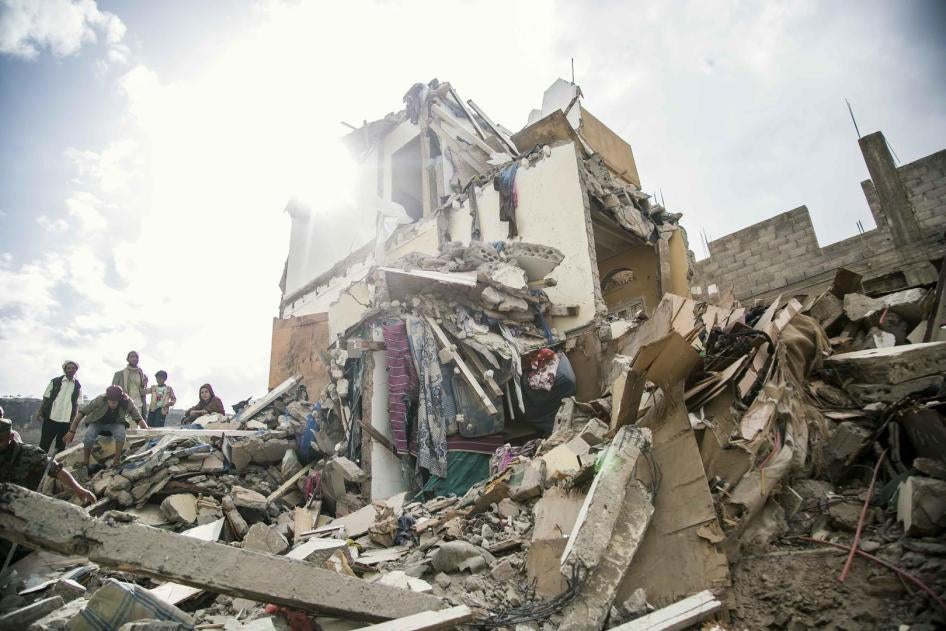The Saudi-led coalition, with military backing from the United States, carried out its aerial and ground campaign in support of President Abdu Rabbu Mansour Hadi with little let-up. In December, after clashes broke out between formly allied Houthi and pro-Saleh forces in Sanaa, Houthi forces killed former President Ali Abdullah Saleh.
“For nearly three years Yemen’s warring parties have committed war crimes with little fear that other governments will hold them to account,” said Sarah Leah Whitson, Middle East director at Human Rights Watch. “United Nations Security Council sanctions on Houthi leaders should be extended to senior coalition military leaders, including Saudi Defense Minister Mohammed bin Salman, for their role in obstructing aid and other abuses.”
In the 643-page World Report, its 28th edition, Human Rights Watch reviews human rights practices in more than 90 countries. In his introductory essay, Executive Director Kenneth Roth writes that political leaders willing to stand up for human rights principles showed that it is possible to limit authoritarian populist agendas. When combined with mobilized publics and effective multilateral actors, these leaders demonstrated that the rise of anti-rights governments is not inevitable.
The conflict has taken a terrible toll on Yemen’s civilians. The Saudi-led coalition has used cluster munitions and carried out scores of indiscriminate and disproportionate airstrikes that have killed thousands of civilians in violation of the laws of war, with munitions that the US, United Kingdom, and others supply. Saudi Arabia pledged in December to reduce civilian harm. Since then, Human Rights Watch documented six coalition attacks that killed 55 civilians, including 33 children.
Formerly allied Houthi-Saleh forces have repeatedly fired artillery indiscriminately into Yemeni cities and southern Saudi Arabia, with a particularly heavy impact on Yemen’s third largest city, Taizz. The UN human rights office called the shelling of Taizz “unrelenting.”
Houthi-Saleh forces have also used antipersonnel landmines, killing and wounding civilians and posing a threat to civilians long after the conflict ends. The Houthis have also blocked and confiscated food and medical supplies and denied access to populations in need, in violation of international law.
The coalition has stopped goods from entering seaports controlled by the Houthis, closed critical ports, destroyed essential infrastructure, and restricted humanitarian workers’ access. Coalition military actions have violated laws-of-war prohibitions on restricting humanitarian assistance and on destroying objects essential to the survival of the civilian population. These violations, as well as the coalition’s disregard for the reported suffering of the civilian population, suggest that the coalition may be violating the prohibition against using starvation as a method of warfare, which is a war crime.
Houthi-Saleh forces, the Yemeni government, and the United Arab Emirates and UAE-backed Yemeni forces have arbitrarily detained people, including children; abused detainees and held them in poor conditions; and forcibly disappeared people perceived to be political opponents or security threats. The number of the “disappeared” grew over the past year. US forces may be complicit in detainee abuse by UAE forces.
None of the warring parties credibly investigated their forces’ alleged laws-of-war violations. In September, the UN Human Rights Council adopted a resolution creating a Group of Eminent Experts to conduct an international investigation and to identify those responsible for abuses in Yemen.
“The US, UK, France, and others are risking complicity in unlawful coalition airstrikes by continuing to provide weapons to Saudi Arabia,” Whitson said. “Faced with the world’s worst humanitarian crisis, governments should be urging the UN to enact sanctions against Saudi leaders, not selling them more bombs to use on Yemeni markets, schools, and hospitals.”








